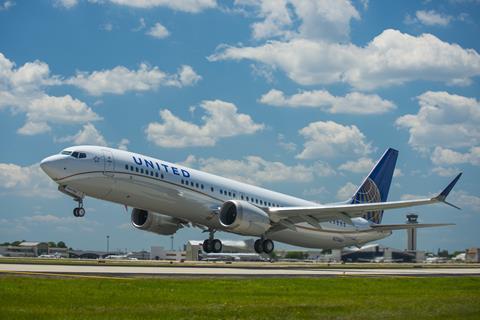Boeing is revising guidance issued to airlines related to inspection of emergency exit door plugs, and the Federal Aviation Administration will need to approve the new procedures.
That is according to the FAA, which says 737 Max 9s with door plugs will remain grounded until it clears the jets to return to service.
When those jets will return to service remains unclear.

“Boeing offered an initial version of instructions yesterday, which they are now revising because of feedback received in response,” the FAA says on 9 January. “Upon receiving the revised version of instructions from Boeing, the FAA will conduct a thorough review.”
The FAA on 6 January issued an emergency airworthiness directive grounding 737 Max 9s, pending inspections. The order affects 171 jets globally, the agency said.
Those aircraft have the same type of mid-cabin emergency exit door plugs as the plug that failed on an Alaska Airlines 737 Max 9 during a flight on 6 January. That event left a large hole in the jet’s cabin. The pilots landed the aircraft in Portland without serious injuries to passengers or crew.
Boeing on 8 January said it issued guidance to customers about how to conduct the inspections. On the same day, the FAA said it “approved a method to comply with the” airworthiness directive, without specifying whether it approved Boeing’s method.
Now Boeing is revising its guidance, which will require the FAA’s approval. Boeing did not respond to questions about the revisions.
“Every Boeing 737-9 Max with a plug door will remain grounded until the FAA finds each can safely return to operation,” the agency says. “The safety of the flying public, not speed, will determine the timeline for returning the Boeing 737-9 Max to service.”
Separately, Boeing chief executive David Calhoun told employees on 9 January that the company will take full responsibility for any shortcomings on its part. Boeing has not speculated about the cause of the incident, which the National Transportation Safety Board and FAA are investigating.
“We’re going to approach this, number one, acknowledging our mistake. We’re going to approach it with 100% and complete transparency every step of the way,” Calhoun told Boeing staff during a meeting open to all employees. “We are going to work with the NTSB, [which] is investigating the accident itself to find out what the cause is.”
Carriers including Aeromexico, Alaska, Copa Airlines, Lion Air, Turkish Airlines and United Airlines have grounded 737 Max 9s as a result of the issue.


























